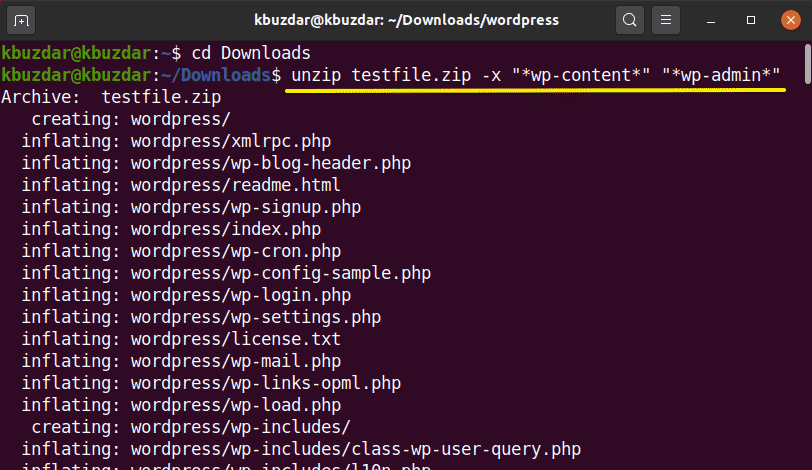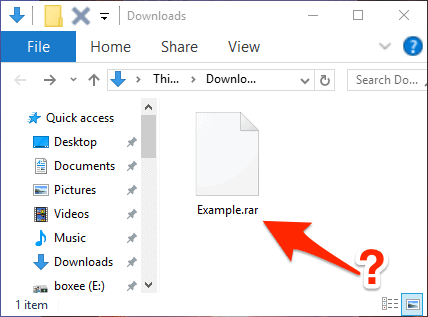
gz files are archives compressed using the Gzip utility. You can use the following methods to extract the various formats. There are different compression methods and you’ll very often encounter different formats. No errors detected in compressed data of some_folder.zip. Testing: some_folder/this_is_a_file.txt OK Testing: some_folder/google-chrome-stable_current_b OK This option extracts each specified file in memory and compares the CRC (cyclic redundancy check, an enhanced checksum) of the expanded file with the original’s stored CRC value. For this, we can use the -t flag with the unzip command.
UNZIP FILE LINUX ARCHIVE
You may want to make sure your archive isn’t corrupted.
UNZIP FILE LINUX ZIP FILE
zip archive, we can simply use the unzip command: $ unzip some_folder.zip 3 – Test the Integrity of a Zip File We can use the -l flag to list the contents of a zip file, without extracting it.
UNZIP FILE LINUX HOW TO
$ zip -0 some_folder.zip some_folder/* How to Unzip Files in Linux 1 – List Contents of a Zip File 9 is the highest compression level $ zip -9 some_folder.zip some_folder/* The zip command allows you to adjust the compression level from 0 to 9. If you need to protect your archives, you can password protect them using the -P flag: $ zip -P some_folder.zip some_folder/* 5 – Adjust Zip Compression Levels $ zip -r some_folder.zip some_folder 4 – Password Protect Zip Files Using the zip command with the -r flag, we can create an archive recursively, thereby compressing subdirectories as well. txt files: $ zip some_folder_txt.zip some_folder_txt/*.txtĮxample Output adding: some_folder/this_is_a_file.txt (deflated 0%)Īdding: some_folder/this_is_another_file.txt (stored 0%) 3 – Zip Files Recursively Using wildcards, we can zip files that files that have a specific extension. $ zip some_folder.zip some_folder/*Įxample Output adding: some_folder/a_nf (stored 0%)Īdding: some_folder/Anaconda3-2018.12-Linux-x86_64.sh (deflated 0%)Īdding: some_folder/GettyImages-845976972-5b1977813de42300372a76c8.jpg (deflated 6%)Īdding: some_folder/google-chrome-stable_current_b (deflated 0%)Īdding: some_folder/mr_file (deflated 0%)Īdding: some_folder/some_script.py (deflated 0%)Īdding: some_folder/this_is_a_file.txt (deflated 0%)Īdding: some_folder/this_is_another_file.txt (deflated 0%) 2 – Zip Files by Extension using Wildcard It does not create an archive recursively, however. zip archive of all the files in a directory.

The options used with the cpio command are described as follows.Get started now 1 – Zip Files in Directory The rpm2cpio command extracts a cpio archive from an RPM file, and cpio command extract files from the cpio archive. This will extract all files in foo.rpm into the current directory. Once the necessary tools are installed, proceed as follows.
UNZIP FILE LINUX INSTALL
For Ubuntu, Debian or Linux Mint: $ sudo apt-get install rpm2cpioįor CentOS, Fedora or RHEL: $ sudo yum install rpm Install Necessary Toolsįirst, install necessary command line tools. The following describes how to achieve this from the Linux command line. If you want to extract files from an RPM package without installing it, here is how: first obtain a cpio archive from the RPM file, and then extract actual files from the cpio archive. You can view the content of an RPM package with rpm or repoquery command. These files are packaged in a cpio archive format, and finally wrapped in an RPM file along with any necessary package-specific metadata.


Is there an easy way to extract files from an RPM package without installing it?Īn RPM package contains a set of files, typically compiled software binaries, libraries, and their development source files. Question: I downloaded an RPM file ( foo.rpm) from somewhere, and I would like to manually extract files from the RPM package.


 0 kommentar(er)
0 kommentar(er)
